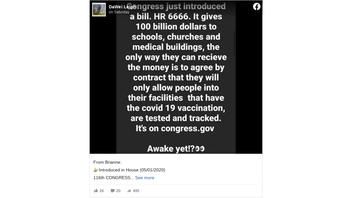
Does House Resolution 6666 ban people not vaccinated for COVID-19 from entering churches, schools, and medical buildings that receive money from the legislation? No, that's not true: No provision in this proposal makes vaccinations mandatory. In fact, nowhere in the 664-word document does the word vaccine even appear. Also, there is no vaccine for COVID-19 yet.
The claim originated in a meme (archived here) posted on Facebook on May 9, 2020. The meme read:
"Congress just introduced a bill. HR6666. it gives 100 billion dollars to schools, churches, and medical buildings ... the only way they can receive the money is to agree by contract that they will only allow people into their facilities that have the COVID-19 vaccination [and] are tested and tracked."
This is what the post looked like on Facebook at the time of writing:
HR 6666 has also been the subject of false claims that it hides a conspiracy to forcefully quarantine, vaccinate or control Americans, and that even the bill's number -- 6666 -- makes it suspect as "the bill of the beast." Numbers on Senate and House bills are simply consecutive, spit out by a computer based on however many bills came before.
So, what does HR 6666 really do? The bill, as introduced by Rep. Bobby Rush, a Democrat from Illinois, is found here.
It would provide $100 billion in grants to faith-based organization, clinics, medical centers, and other organization that perform testing for COVID-19, tracing of exposure to COVID-19, or services for patients who are isolating at home. The bill protects the privacy of people tested. The money is to be used to pay staff of these mobile units or purchase personal protective equipment to protect their staff. It was designed to improve Americans' health through mobile testing in medically underserved areas. It is being called the TRACE Act: COVID-19 Testing, Reaching, And Contacting Everyone.
Its priority is to bring testing to "hot spots," which means a geographic area where the rate of infection with COVID-19 exceeds the national average.
Requiring vaccinations is not -- and cannot -- be part of the bill because a COVID-19 vaccine is months-to-years away. More than 60 candidate vaccines are now in development, worldwide, and only a few have entered early clinical trials in human volunteers.
Developing a safe, effective vaccine against a new health threat typically takes years, and sometimes decades. That's because, unlike with experimental treatments, it's impossible to know right away if a vaccine has worked.
The first COVID-19 vaccine to enter clinical trials, for example, uses a genetic molecule called mRNA as its base. Scientists generate the mRNA in the lab and, rather than directly injecting SARS-CoV-2 into patients, they introduce this mRNA. By design, the vaccine should prompt human cells to build proteins found on the virus' surface and thus trigger a protective immune response to it.
















